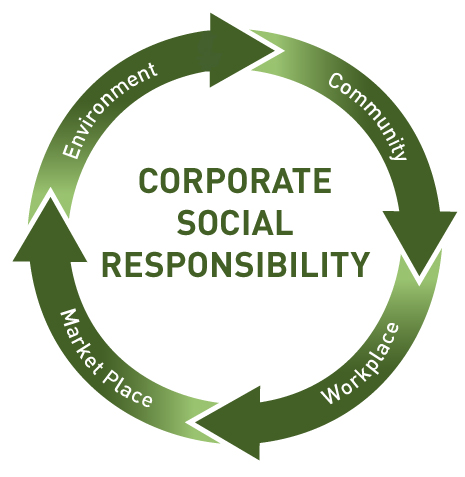How corporate governance affects social responsibility

Corporate social responsibility, which is critical to business owners and the communities at large has suffered lots of setback in Nigeria.
This, many attribute to failure of corporate governance in a society which practices are essential to achieving and maintaining public trust and confidence.
Analysts believe that what is happening in Nigeria more often than not is nothing but corporate investment where brand handlers use subtle marketing skill to make the larger society believe that it is corporate social responsibility.
For these analysts, while a strong corporate governance culture in an organization encourages success and business sustainability, poor corporate governance may contribute to bank failures which could in turn lead to a run on the bank, unemployment and negative impact on the economy as well as corporate social responsibility.
Checks by Daily Times revealed that, effective governance requires a proactive culture of commitment and engagement that drives both the board and the organization it governs toward high performance.
Engaged cultures are characterized by honesty and a willingness to challenge, and they reflect the social and work dynamics of a high-performance team.
Speaking on this issue recently in Enugu during the fifth annual conference of the Brand Journalists Association of Nigeria (BIJAN) with the ‘corporate governance, public accountability and the challenge of re-positioning Nigeria, chief executive officer core experiential marketing limited, Solabomi Okonkwo said;
“the failure of some companies in the area of corporate social responsibility in Nigeria is as a result of weak or complete absence of corporate governance structures.”
According to her,” in 2005, there were eighty nine deposit banks operating in a highly concentrated market with the top ten banks accounting for over eighty per cent of the total assets/liabilities.
The statutory capitalization requirement was N2 billion and the small size of these banks had an adverse effect on their cost structure thus making the cost of intermediation high.”
Further, she pointed out that, “the total capitalization of all Nigerian banks then stood at N293 billion, which was just the size of the fourth largest bank in South Africa.
As a result Nigerian banks were unable to finance major transactions in the growing oil and gas, and telecom sectors, which constitute the fastest growing sectors in the Nigerian economy.”
While commenting on the way out she stated that, “in my opinion for a code of ethics to be global, it must entail some generalist as well as generic attributes.
For instance, an international code of business ethics must traverse countries, cultures, race, and environment.
Also speaking on this issue, A management consultant, pemi Samuel disclosed that; “I have come to appreciate the fact that societies are complex and dynamic in nature.
Necessitating the need to conduct proper stakeholder analysis achievable only through effective communication methods and managing expectations.”
While speaking on forward of how corporate governance affect corporate social responsility, he pointed out that, “exploring the various approaches to adopt in ensuring that Leaders within Nigerian organisations begin to drive the required change and implement standards that will forestall non-compliance to in-country business and regulatory policies.”
“Managers as well as leaders can effectively improve their sense of right and wrong in themselves, in a work place and in the society by conducting what I reference to as a personal reflexive test.
Helps in emphasizing eureka moments in a workplace, referred to as the three-defining moments.” He said.
He also disclosed that, in reviewing the similarities of the narrative above, all three models require reflexive unbiased thinking with an ability to accept critique, ability to collect and analyze gaps in morals and seek out solutions to fixing unethical gaps identified
For him, “Ethical Room For Maneuvering is a time bound process that takes into consideration social-economic variables and interest such that it breaks into the fabric of society and all its inhibitions to ethics.
It’s all encompassing as it considers the threats as well as opportunities that can be derived by the citizen or customer within the society and off course with the probability to extendable such variables across other countries and regions, thereby providing the ground rules for establishing a truly international code of ethics. “
For instance, he continued, the needs of one society can be mapped onto the needs of others such that ethical codes can be replicated and re-usable across boundaries and bounders as emphasized by the “EU general Food Law, based on its ability to enable full compliance with strict rules”.
He also disclosed that “two major pros which are its ability to minimize threat of coercion and eliminating restrictions to general societal needs while communicating to stakeholders via a proper collaborative framework that engenders ownership and acceptance.
Nevertheless, “Ethical Room For Maneuver” (ERM) still possess cons such as its dependency on information stream and time-investment required in stakeholder validation and verification of data collection, input, analysis, processing, output and review.”
“The “Ethical Room For Maneuver” (ERM) concepts and its framework appeals greatly to work-base problem and begins to empower us with the required tools such as an ethical traceability scheme
thereby ensuring leadership remains committed to building efficacy and efficiency in the organization’s code of conduct with prejudice for norms and also help to collaborate internally in ensuring absolute compliance to both local and international business codes of ethics. “ he added









